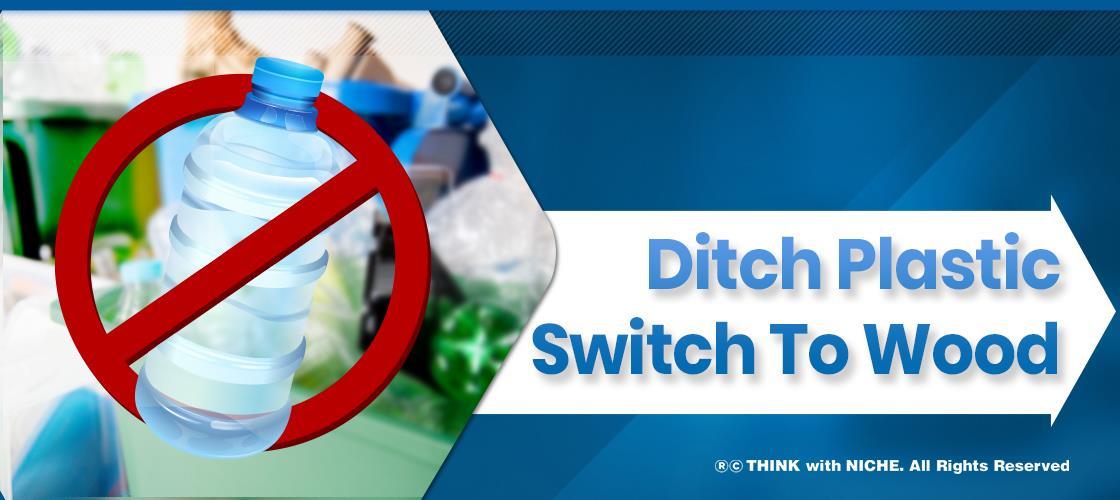Ditch Plastic - Switch To Wood

Blog Post
Take a look around you; you'll probably find a lot of objects, both ones you use everyday and ones you can't live without. If you look closely, you'll notice that the majority of these items are made of a common material known as 'polyethylene,' or simply put-plastic. When plastic was first produced, it was viewed as a blessing in disguise because it dramatically reduced the cost of production and was widely available around the world; however, the earth is now choked with plastic pollution, and there appears to be no way out. #ThinkWithNiche
Wood, a renewable resource that can be sourced easily from sustainably managed forests can be the new option to cut down the use of single-use plastic and help us solve the crisis of plastic pollution. The way humans are exploiting the consumption of plastic, it is no wonder that plastic has managed to reach the deepest point in the Pacific Ocean- Mariana Trench. Most of us don’t know but there is a huge island of floating plastic in the north of the Pacific Ocean known as the ‘Great Pacific Garbage Patch’ plastic debris floating in one of the world’s biggest oceans, measuring approximately 1.6 million square kilometers or three times the size of France, while there is no surprise that this floating mass of marine plastic debris is expanding by the day, given the fact that all of world’s trash from across the globe is thrown into the oceans. The fine marine plastic is not only polluting the oceans, but it is also harming the marine life within the ocean, each year several species of fish are dying due to plastic pollution, and many whales and other fishes wash up the beaches with loads of plastic articles inside their stomach and many extremely rare turtles fall prey to plastic nets and lose their lives.
While the options for reducing plastic use are limited, we can still attempt; therefore, let us now look at how we may reduce plastic consumption and replace it with wood-
1. Cut Down Plastic
Among many other things that are made of wood today, kitchen utensils remain on top, utensils such as wooden knives, forks, pots, pans spoons, and ladles are a great alternative to their plastic counterparts. Not only are they health-friendly but they also are non-stick utensil friendly, meaning they will not cause any scratches.
2. Packaging Material
Research has shown that micro- fibrillated cellulose obtained from wood can be used as an eco-friendly alternative instead of traditional plastic packaging. It is found to be more resilient and safe enough for food packaging.
3. Wooden Construction Material
Wood has been known to be rather ornamental but research has shown that wooden construction material can be durable and reliable than concrete. Wood is one of the world’s most versatile and strong renewable materials and with the support of an intelligent fire sensing system, wooden construction is good to go. It has benefits in relation to thermal, acoustic, electrical, and mechanical.
4. Invest In Wooden Furniture
A plastic table might seem cheap in monetary terms but who will pay for the cost of carbon emission of plastic? Switching to wooden furniture might sound just about right. A table made of wood could significantly help to cut down carbon emissions, carbon emissions are also known to worsen the greenhouse gas effect. Furniture made of plastic requires a lot of energy and cost whereas wooden furniture is an eco-friendly option and far more sustainable one.
5. Change Your Toothpaste
This might sound rather strange but switching to a wooden toothbrush will help the cause of planet earth more than any other insignificant effort. While many of us change toothbrushes twice a month, imagine the heap of plastic we are generating, therefore adopting the habit of using a wooden toothbrush will not only reduce our plastic consumption, it will also help the planet breathe a little easier. Follow the slogan, “Choose wood, save Earth”.
Researchers say, “Wood is a promising material” and there is no doubt that it will help tackle the plastic menace up to a certain level and give us a chance to save our planet from clutches of plastic and its artificiality.
You May Like
EDITOR’S CHOICE












